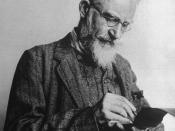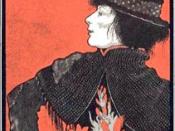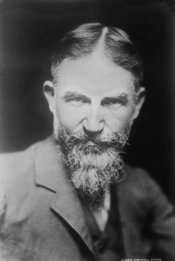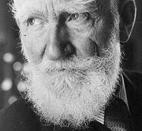George Bernard Shaw author of Pygmalion the play and Pygmalion the screenplay offers two different endings to his story. The distinction between the two accounts lies in Eliza's decision to pursue an intimate relationship with either Freddy, as depicted in the play or Higgins as represented in the screenplay. Because of Higgins' mere interest in Eliza as a subject of study and the insensitive attitude he conveys towards her, it is unlikely that Eliza would want to develop an intimate relationship with Higgins. The play ending of Pygmalion is thus, more feasible than the screenplay ending.
Henry Higgins fails to treat Eliza in a compassionate manner. Higgins' insensitivity towards Eliza is explicitly depicted throughout Pygmalion via a combination of the callous comments he expresses and his utter disregard for Eliza's feelings. Due to the inconsiderate behaviour that Higgins conveys with respect to Eliza, it is implausible that Eliza would develop an intimate relationship with Higgins.
Act II of Pygmalion meticulously portrays Higgins' heartless attitude towards Eliza. When Eliza arrives at Higgins House to inquire about talking lessons, she is greeted with abrasive hostility from the professor. As soon as Eliza is ushered inside, Higgins abruptly recognizes her with unconcealed disappointment and immediately behaves as if her mere presence was an intolerable grievance (13). Higgins then proceeds to engage in boorish conversation with Eliza, subjecting her to humiliating derision. Over the course of discussion, Higgins persistently brands Eliza with debasing insults calling her baggage, so deliciously low "" so horribly dirt, a draggletailed guttersnipe, and an ungrateful wicked girl (14, 16, 18). In addition, Higgins degrades Eliza by threatening to throw her out the window, put her in the dustbin, make her sleep among black beetles and wallop her with the broomstick (14, 17, 20). The barrage of insults and threats directed on Eliza cause her to shriek in trepidation and conceive of Higgins as a brute (18).
Higgins expresses no sympathy for Eliza's emotions. Unsettled by Higgins' blatantly inconsiderate behaviour towards Eliza, Cornel Pickering asks, "Does it occur to you, Higgins, that the girl has some feelings?" To which, Higgins imprudently replies, "Oh no, I dont think so. Not any feelings that we need worry about". In addition, when Eliza responds protesting that she does have emotions, which ought to be respected, Higgins uncompromisingly ignores her (18).
Act IV of Pygmalion further reveals Higgins' insensitive attitude towards Eliza. As Cornel Pickering and Higgins discuss the night's events after successfully passing off Eliza as a duchess at the ambassador's garden party, Higgins (in the presence of Eliza) describes the whole experiment with Eliza was a tremendous burden. Higgins thanks God that it's all over, asserting that teaching Eliza "has been a bore" and "simple purgatory" (48, 49). Moreover, Higgins communicates satisfaction in knowing that, because the bet is over, he can "go to bed at last without dreading tomorrow" (49). Eliza was completely ignored by Higgins receiving no praise whatsoever from the professor, in spite of her extraordinary achievement of perfectly comporting herself as duchess at the garden party. Higgins' uncompassionate disregard for Eliza's feelings is summed up by Eliza's statement "You don't care. You wouldnt care if I was dead. I'm nothing to you"æ" (50).
Higgins consistently failed to behave towards Eliza in a caring and considerate manner. It is improbable that Eliza would want to have an intimate relationship with Higgins, because of his pitiless insensitivity to her feelings. Eliza would more likely pursue a relationship with a more compassionate man, such as Freddy.
Higgins is merely interested in Eliza as a subject for phonetic experimentation. Higgins' comments throughout the dialog of Pygmalion make it painstakingly evident that his fascination for Eliza is solely derived from her capacity to learn his teachings and prove that he is a great phonetics professor. It is unlikely that Eliza would want to endeavour in an intimate relationship with Higgins when his exclusive interest in her is purely scientific.
Higgins resolves to assist Eliza and refine her common English into perfect language not out of compassion for Eliza's dilemma, but simply because she is an "irresistible" challenge to his expertise as a phonetics professor. Higgins determines to undertake Eliza as his pupil to ascertain that he is capable of transforming Eliza "with her kerbstone English: the English that will keep her in the gutter to the end of her days"æ" and pass her off "as a duchess at the ambassador's garden party" (8).
Higgins expresses a mere scientific interest in Eliza. In Act II, Higgins articulates his sole scientific appeal for Eliza by stating that he would not try and engage in a intimate relationship with her because "she'll be a pupil; and teaching would be impossible unless pupils were sacred" (21). Higgins avows his stance on Eliza, stating that she might as well be a block of wood (21).
In Act III of Pygmalion, when engaging in discussion about Eliza with Mrs. Higgins and Cornel Pickering, Higgins only speaks about Eliza in terms of a subject of study, conferring the suggestion that Higgins has no real personal interest in her. Throughout the conversation Higgins never once gives credence to Eliza's personality, but only his professional interests as her teacher. Higgins describes his sole appeal in Eliza declaring, "As if I never stop thinking about the girl and her confounded vowels and consonants. I'm worn out, thinking about her, and watching her lips and teeth and tongue" (43).
Higgins is merely interested in Eliza as a subject for phonetic experimentation and not as a human being. Higgins' effectively demonstrates through his commentary that his fascination for Eliza was dependant on her ability to be trained under his teachings. Eliza would not likely want to develop an intimate relationship with Higgins when his primary interests in Eliza are scientific.
In Pygmalion both the play and screenplay, Higgins demonstrates a mere interest in Eliza as a subject of study and a lack of compassion for her feelings. Given Higgins overall inconsiderate attitude towards Eliza, it is implausible that she would pursue an intimate relationship with Higgins as portrayed in the Pygmalion screenplay. Eliza, endeavouring in a relationship with Freddy is much more probable, because Freddy affectionately contrasts the insensitive Higgins.
Works Cited Asquith, Anthony and Leslie Howard. Dir. Pygmalion.
Screenplay by George Bernard Shaw.
Janus Films, 1938.
Shaw, George Bernard. Pygmalion. 1916.
New York: Dover, 1994.






